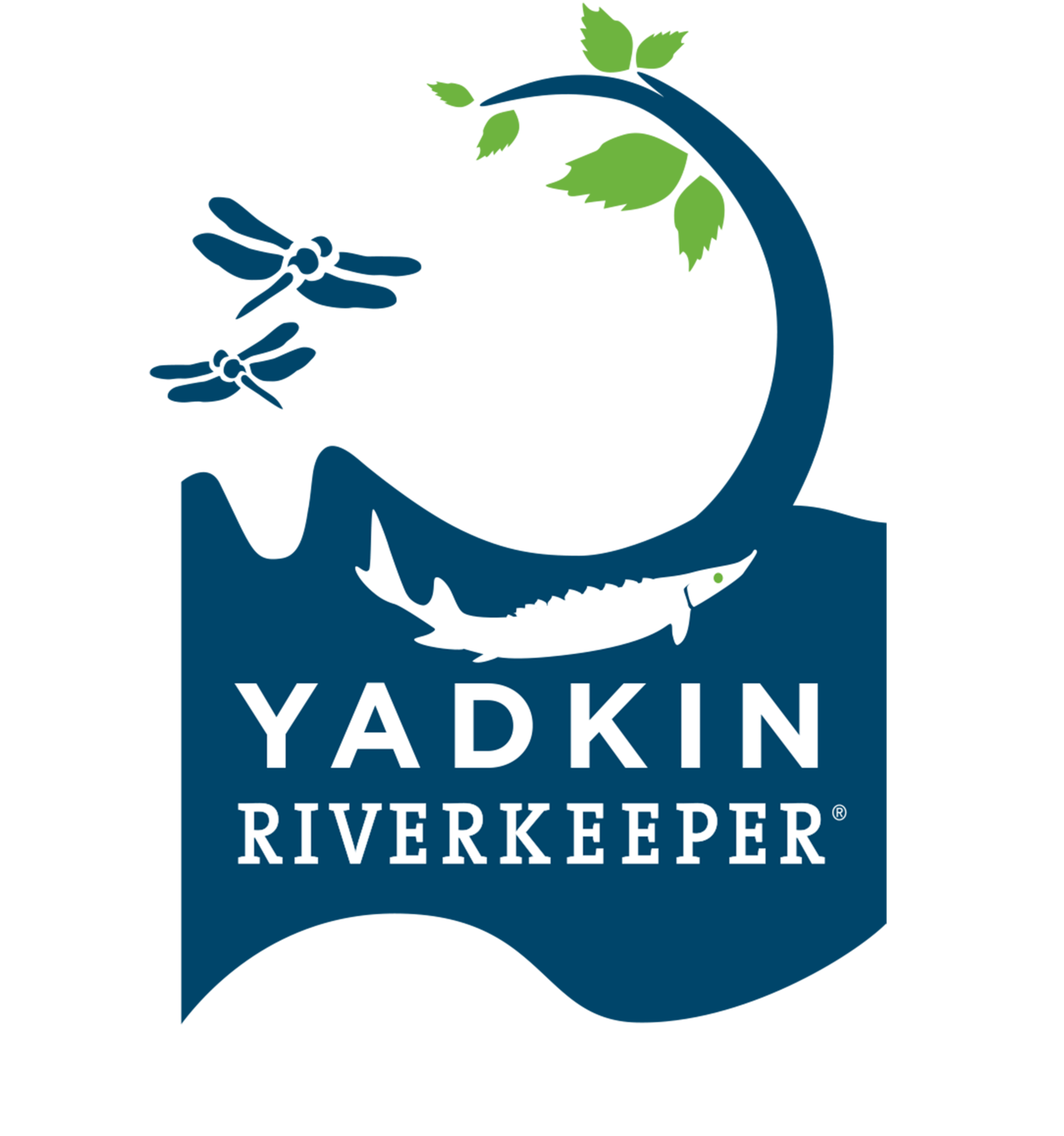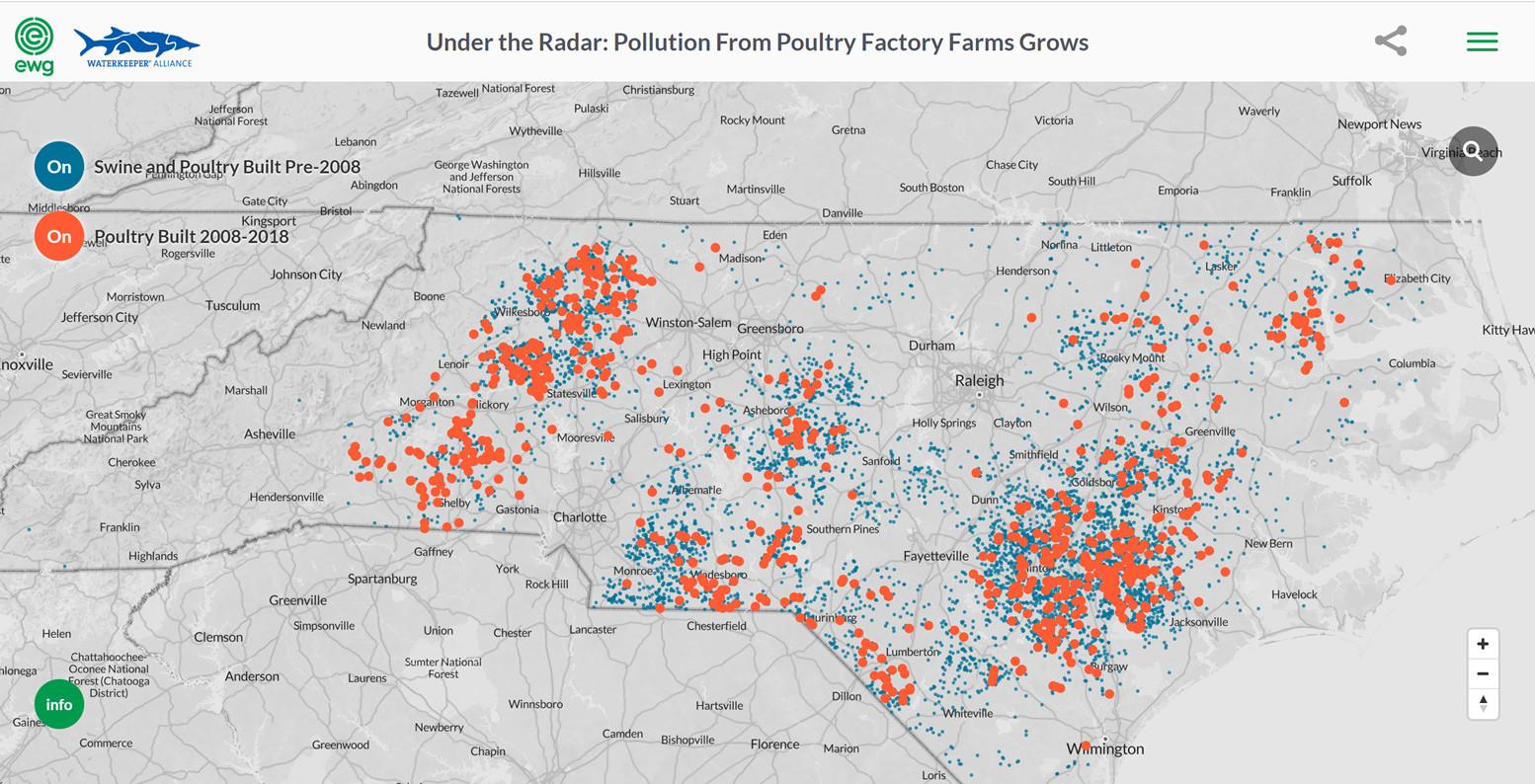North Carolina Riverkeepers, including Yadkin Riverkeeper, are engaged in a high stakes battle to reign in the proliferation of concentrated animal feeding operations or CAFOs across the state. While it is true there has been a moratorium in place on new industrial hog operations (IHOs) using lagoon and spray field technologies for more than 20 years, the Environmental Working Group and the Waterkeeper Alliance have recently issued a new report, ground truthed by our Riverkeeper, documenting a significant expansion of poultry operations in the state.
The new report, entitled, "Under the Radar," indicates the rate of growth of new poultry houses in North Carolina has doubled between 2016-18, with more than 120 operations being added per year in that time frame. More than 735 new industrial-scale poultry facilities have been added during the past 10 years. These facilities are largely unregulated with no siting or permitting requirements at the state or federal level. Click on this link to view an interactive Poultry Farm Map.
In addition to the concern about the proliferation of poultry operations, the NC Department of Environmental Quality (NC DEQ) is also updating its general permit requirements for large scale swine, cattle and poultry production facilities that use liquid waste management systems. As noted above, no new lagoon facilities for swine have been permitted since the moratorium went in place in 1997, but the 2,000 plus IHOs in the state that were grandfathered in before the permitting requirements were in place have continued to operate at considerable risk to water quality and public health. These facilities, and cattle and poultry operations with liquid waste management systems, are required to renew their non-discharge operating permit every five years. All current permits are due to expire later this year.
NC DEQ has proposed reasonable, common sense requirements for the new permits. Riverkeepers across the state are supporting new provisions that increase accountability, improve transparency, enhance technology and ensure equity in siting and permitting decisions, with overarching goal being to prevent pollution from CAFOs. At two recent public hearing on the new permitting requirements, Riverkeepers, conservationists, community leaders and environmental advocates expressed strong support for requirements that would require electronic submission of farm and land application records, mandate groundwater monitoring for CAFOs with lagoons in the 100-year flood plain and implement new assessments and technologies to limit the release of excess nutrients and harmful bacteria from spray fields.
Not surprisingly, pork producers, dairy farmers and agribusiness special interests have argued there is no need for the new measures because the general permit prohibits discharge of pollution from these facilities. This assumption ignores the facts that the lagoon/spray field waste disposal method has been considered inadequate to protect water supplies and public health for more than 20 years. In addition, NC DEQ’s most recent compliance report noted nearly seven percent of their once-a-year inspections of these facilities had some form of violation, including unpermitted releases. In a recurring nightmare of sorts, Riverkeepers across the state have also documented unpermitted releases during extreme weather events time and time again. These events also result in significant animal mortality that requires on site burial or composting of dead animals, also leading to more concerns about impacts on groundwater resources.
And that brings us back to the expansion of the poultry industry, the majority of which is occurring in the same communities and river basins that house most of the IHOs. This is causing a great deal of concern not only about the cumulative impacts of these facilities on water resources, but also impacts on communities of color. In a recent letter from EPA’s External Civil Rights Compliance Office (ECRCO) to state regulators, they noted the adverse impacts of CAFOs are disproportionately and systematically impacting communities of color.
Because poultry facilities and land application of dry poultry litter are largely unregulated in North Carolina, we really don’t know what the full, cumulative impact of these expansion are having on water quality in the Yadkin River. We are attempting to quantify that impact through nutrient monitoring on High Rock Lake, where it all ends up, and upstream in the River and its tributaries most impacted by poultry operations. What we can conclude from the WKA/EWG report, is that our state is becoming a target for the expansion of poultry CAFOs due to the lack of adequate regulation.
The new permitting requirements for swine, cattle and wet poultry facilities are a step in the right direction and we will continue to advocate for similar requirements and siting criteria for poultry operations. If you agree with those efforts, please let NC DEQ know by commenting in support of their new permitting requirements by their March 4 deadline. Click here for a sample comment letter/email.
Sample Email:
Dear Animal Feeding Operations Program:
I am writing in support of proposed changes to the General Swine Permit. Specifically, I support the additional groundwater monitoring requirements, electronic reporting requirements, and increased transparency and accountability. The new provisions are a needed step forward to protect air and water quality and communities near these facilities.
I encourage NC DEQ to move forward to finalize the new permit conditions in addition to the groundwater monitoring requirements, including requiring:
- regular submission of waste management records detailing what is sprayed, when it is sprayed, and where it is sprayed.
- the application of the phosphorus loss assessment tool or PLAT, to limit the application of excess nutrients to already overloaded field.
- electronic filing of records made under the permit for ease of access for department staff.
- the use of technology that will automatically prevent prohibited practices like spraying waste in the rain or spraying when it is too windy.
While I would like to see additional requirements to prevent the release of excess nutrients and harmful bacteria, the proposed permitting requirements are good steps toward preventing water pollution from large scale animal feeding operations.
Thank you for your consideration.

